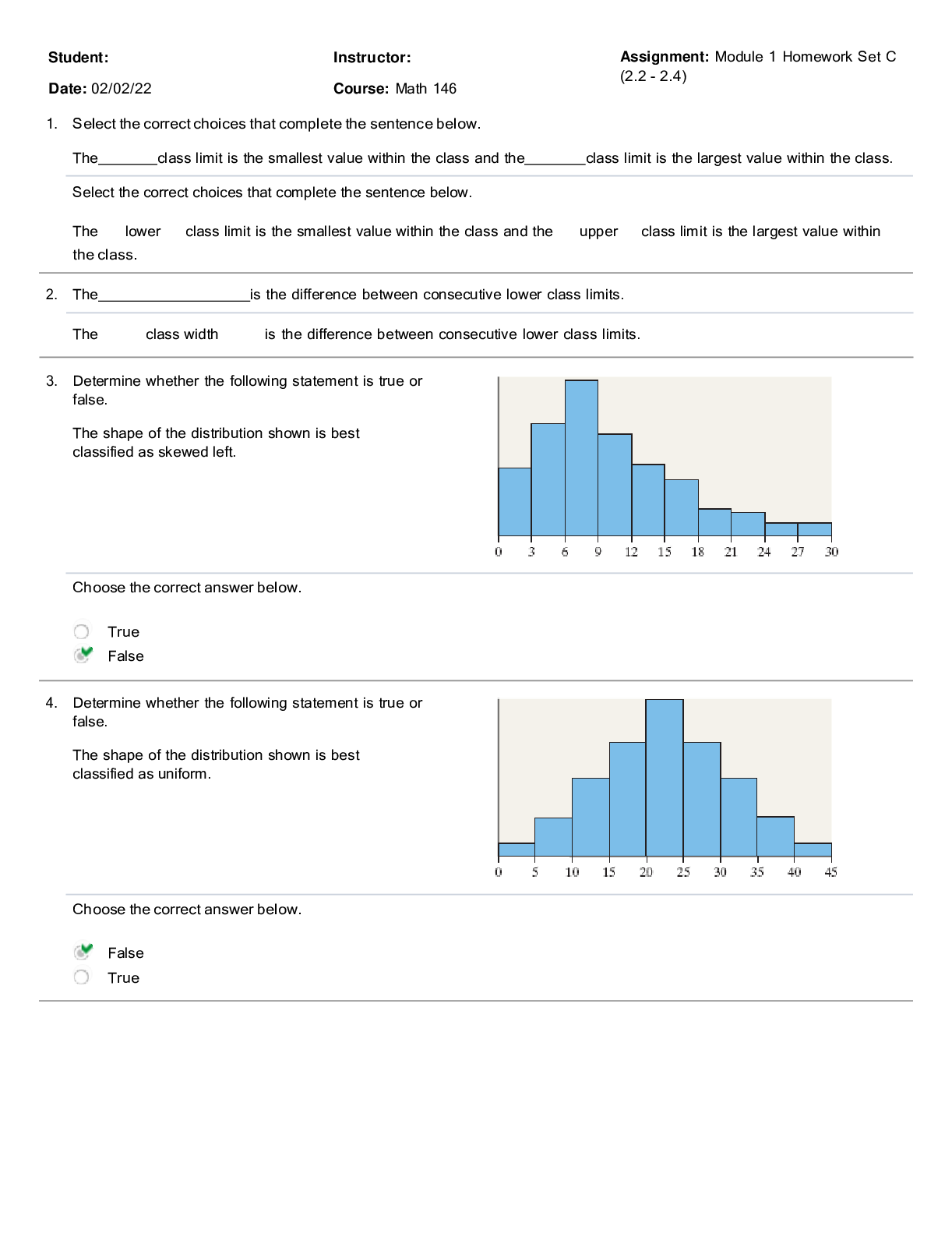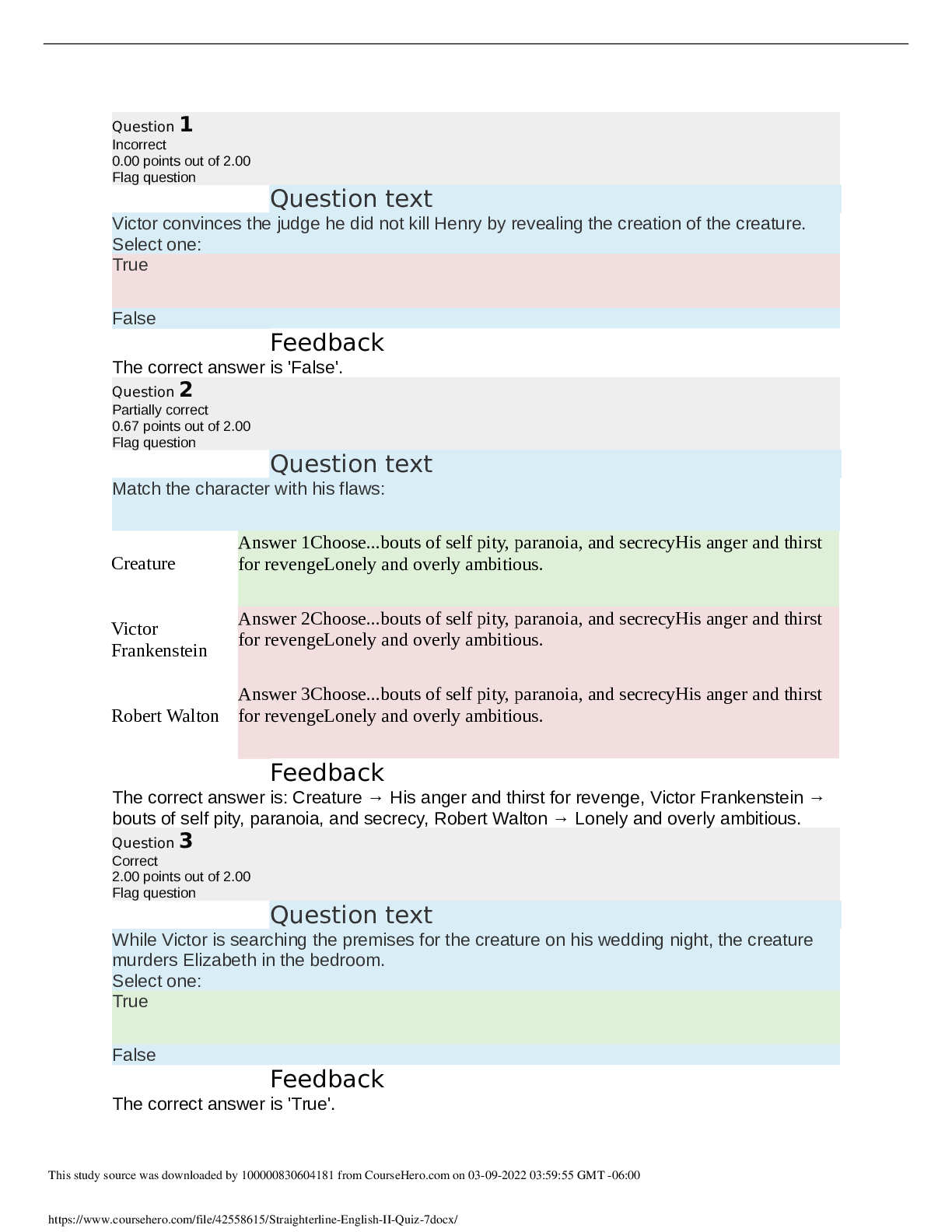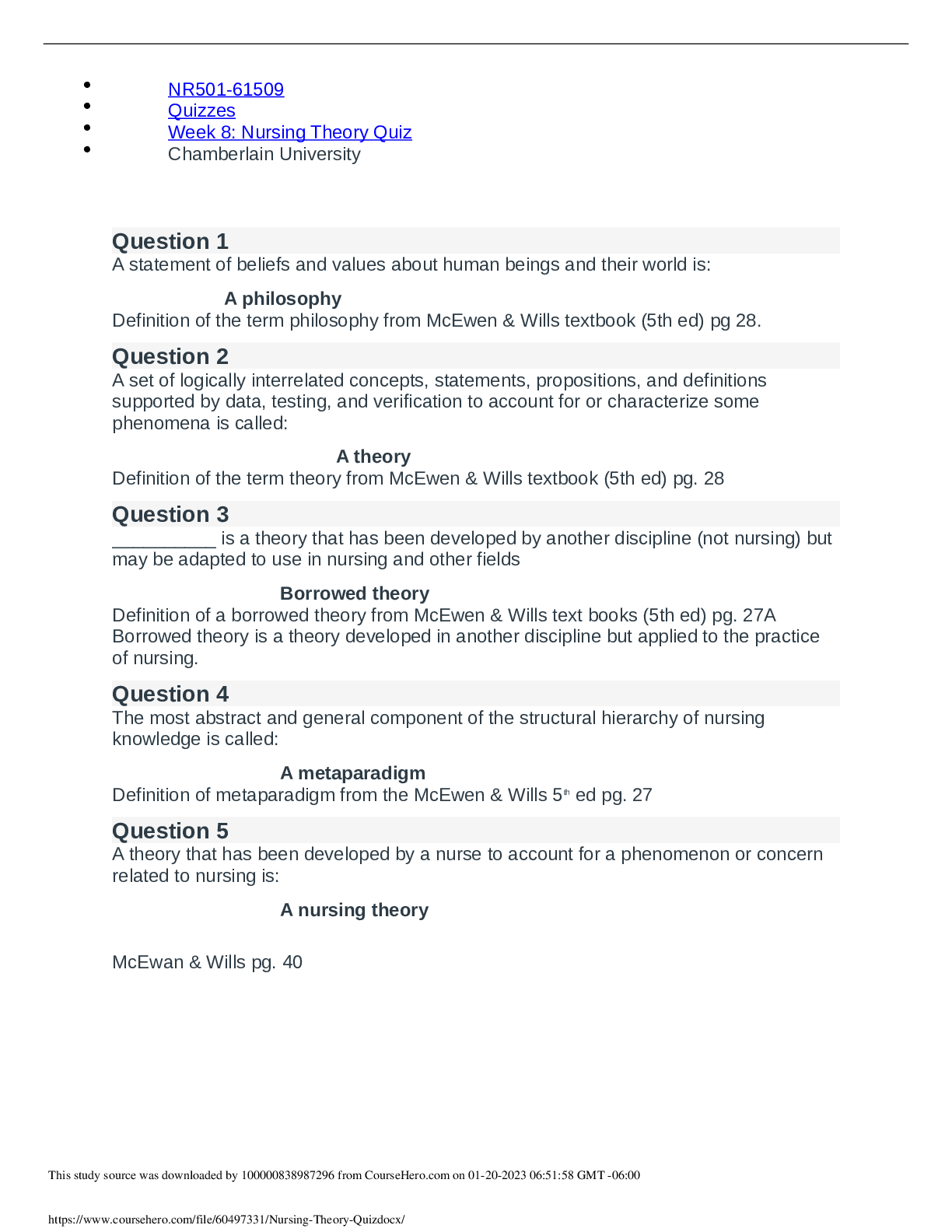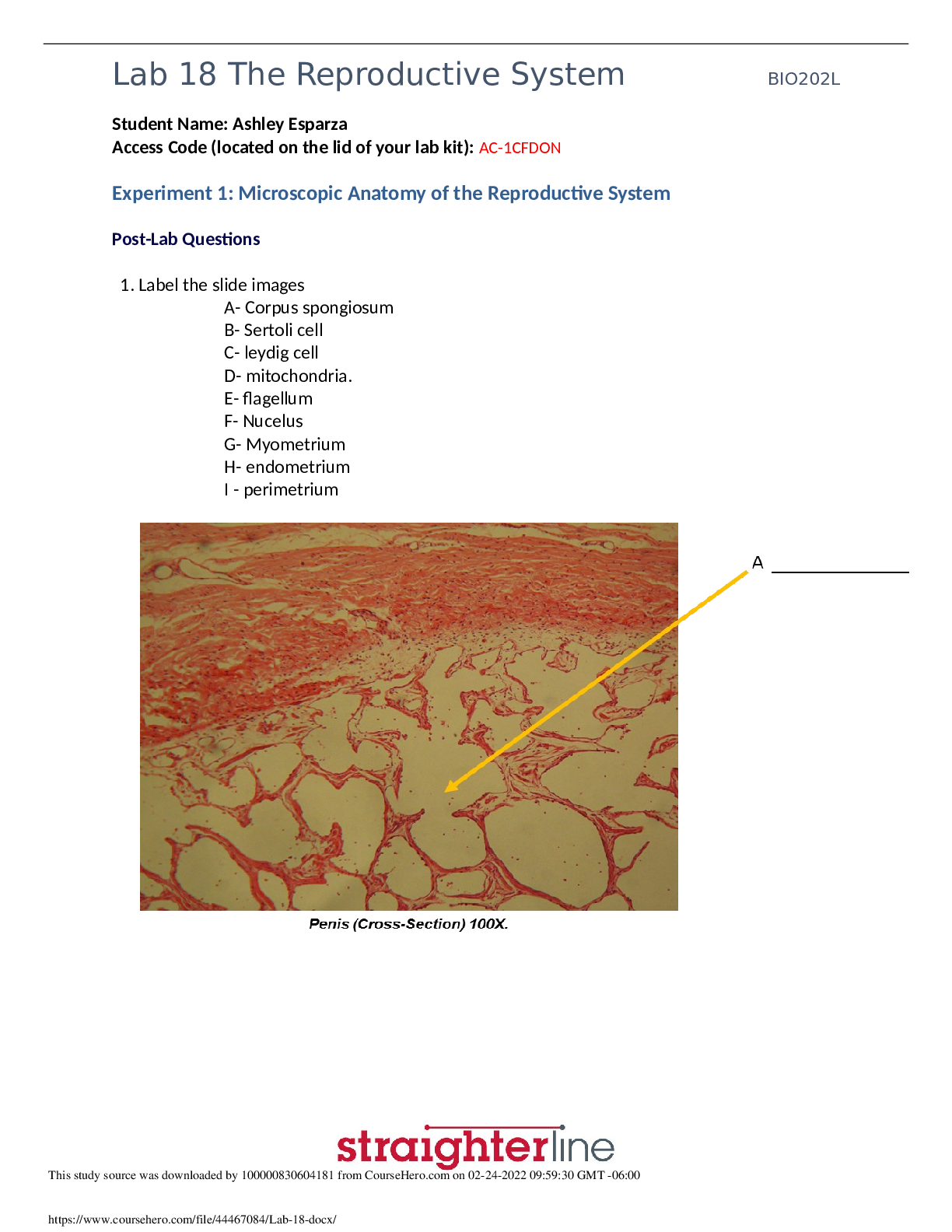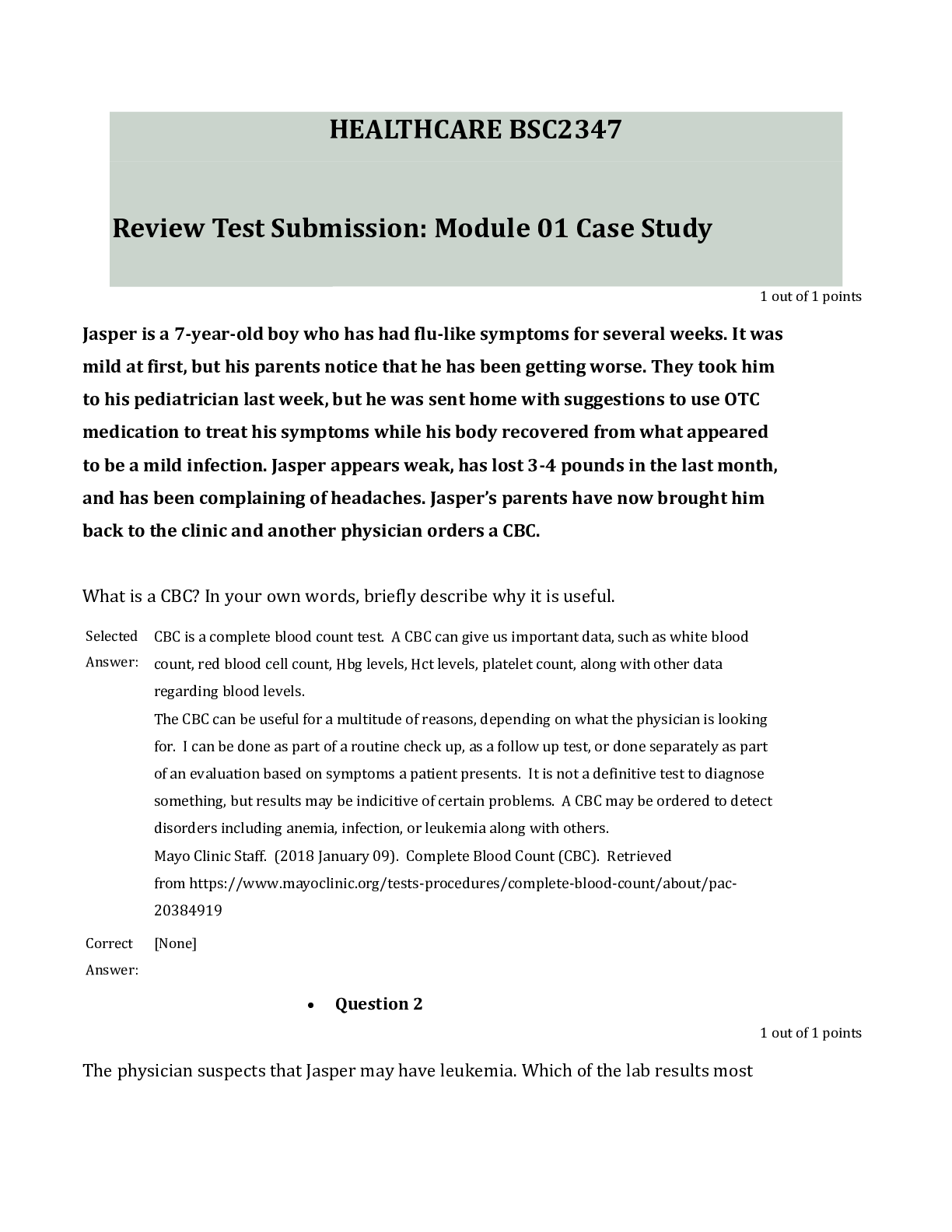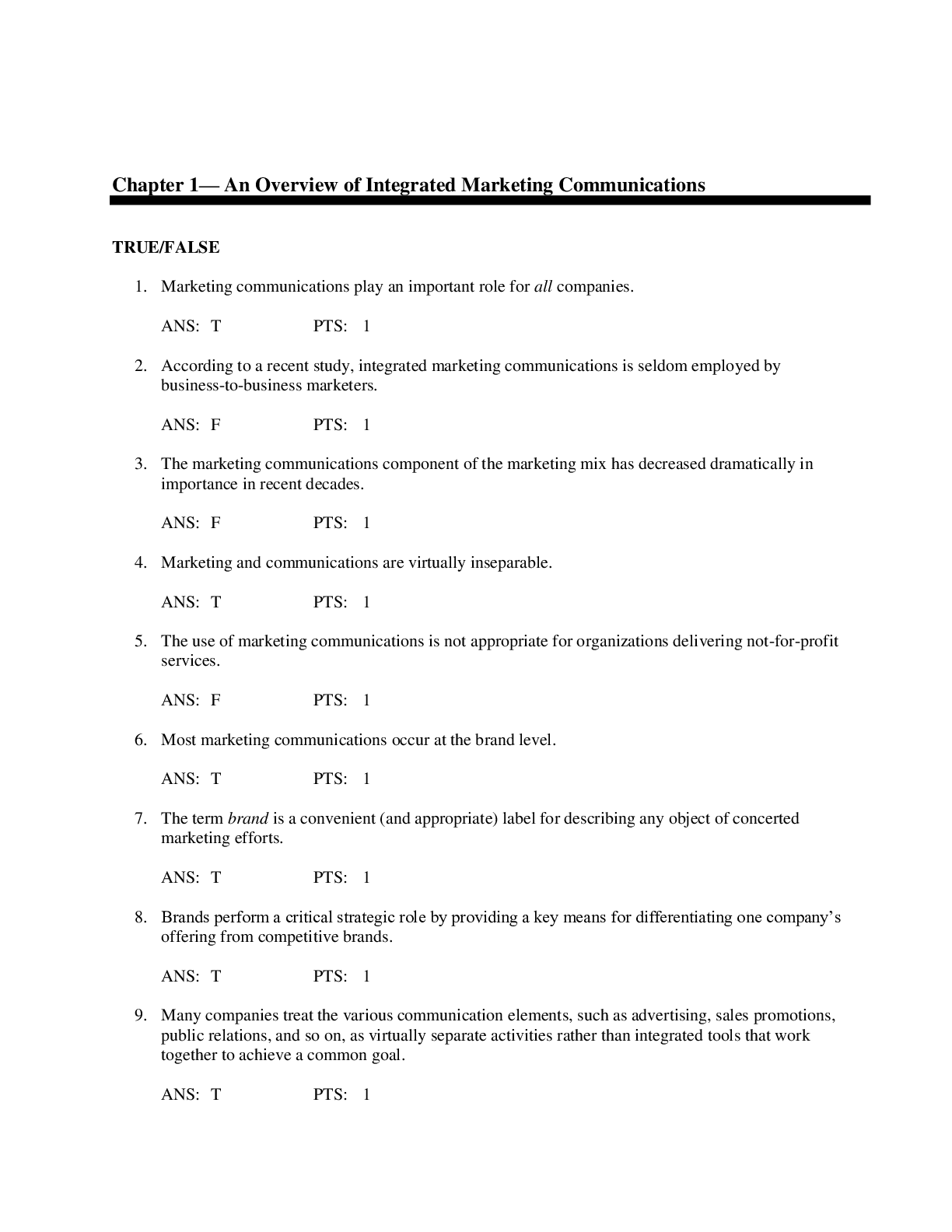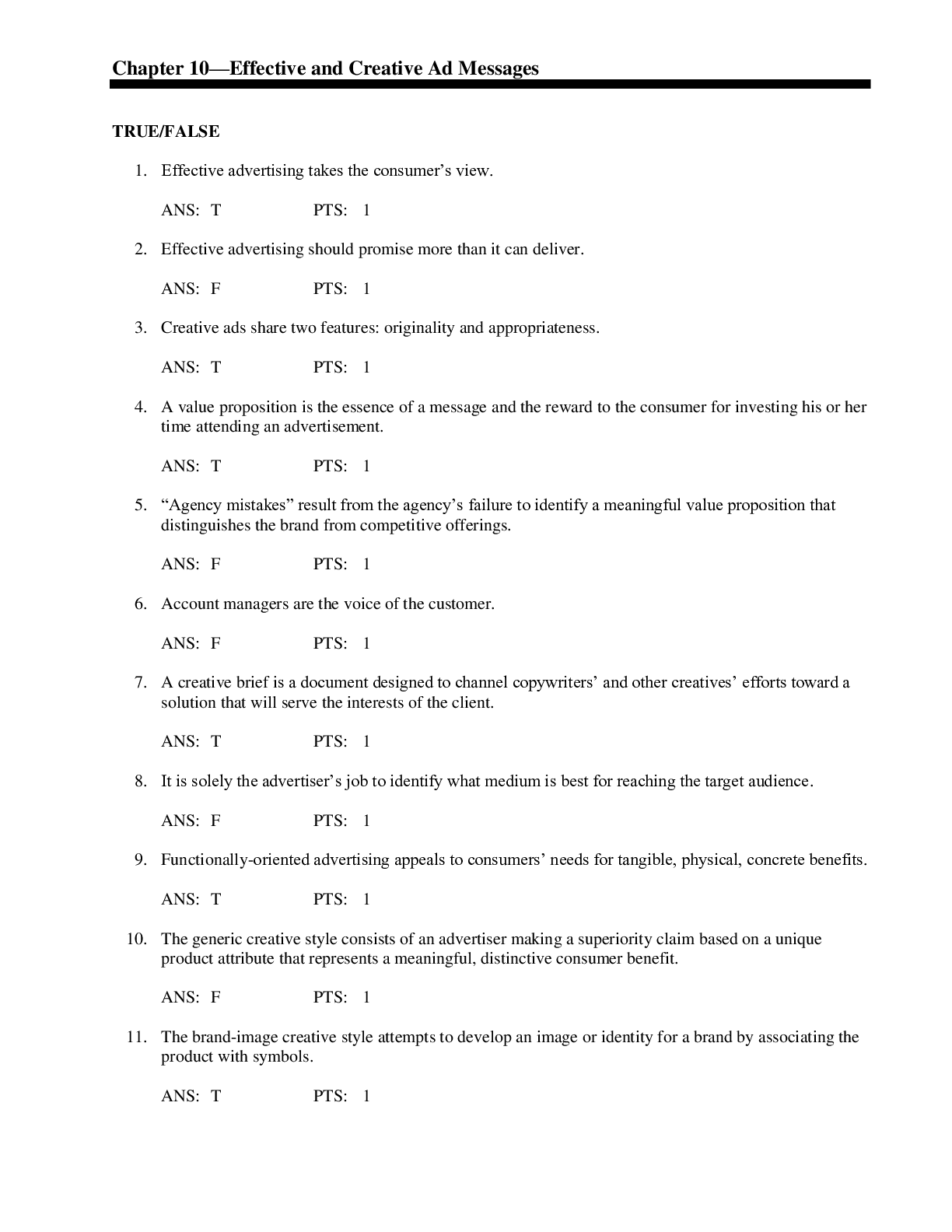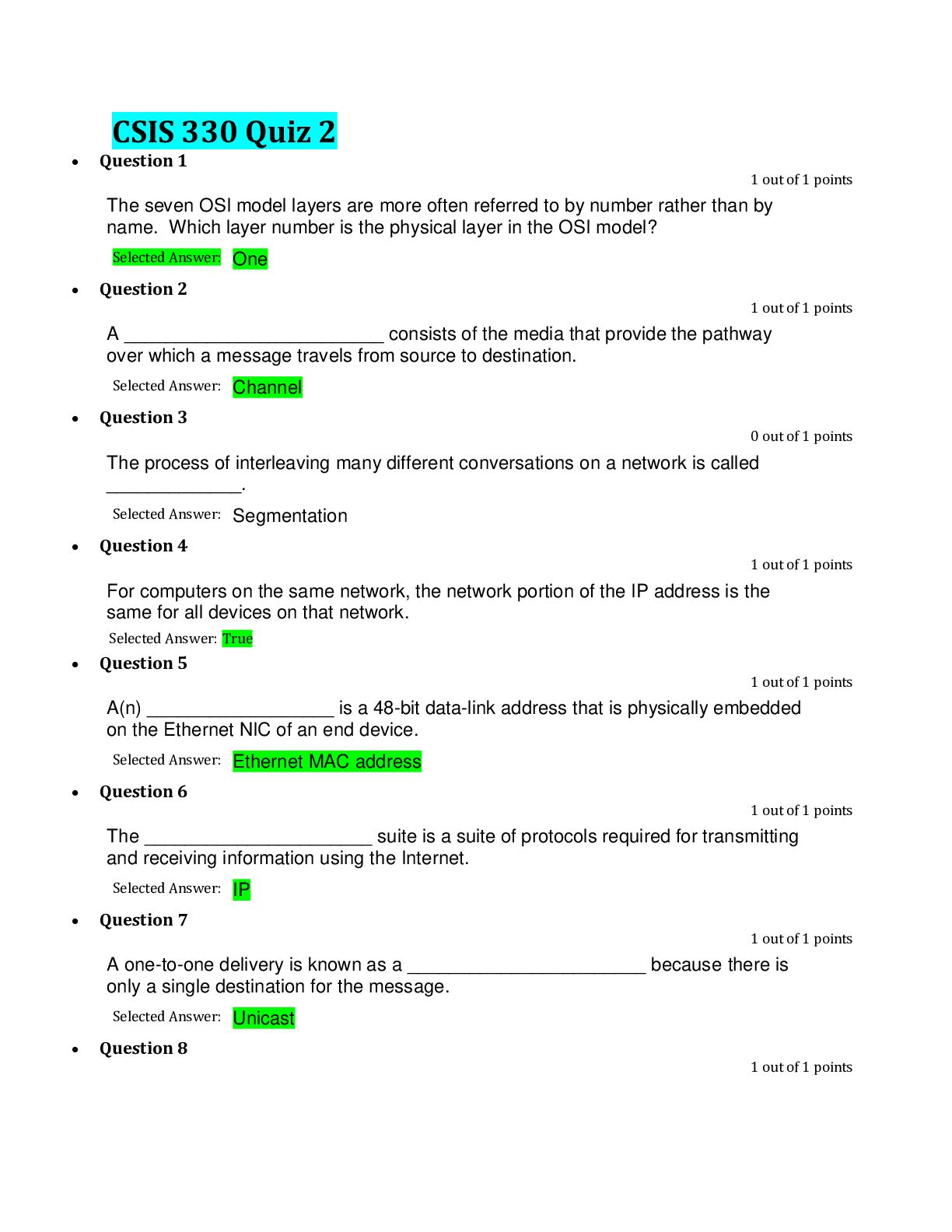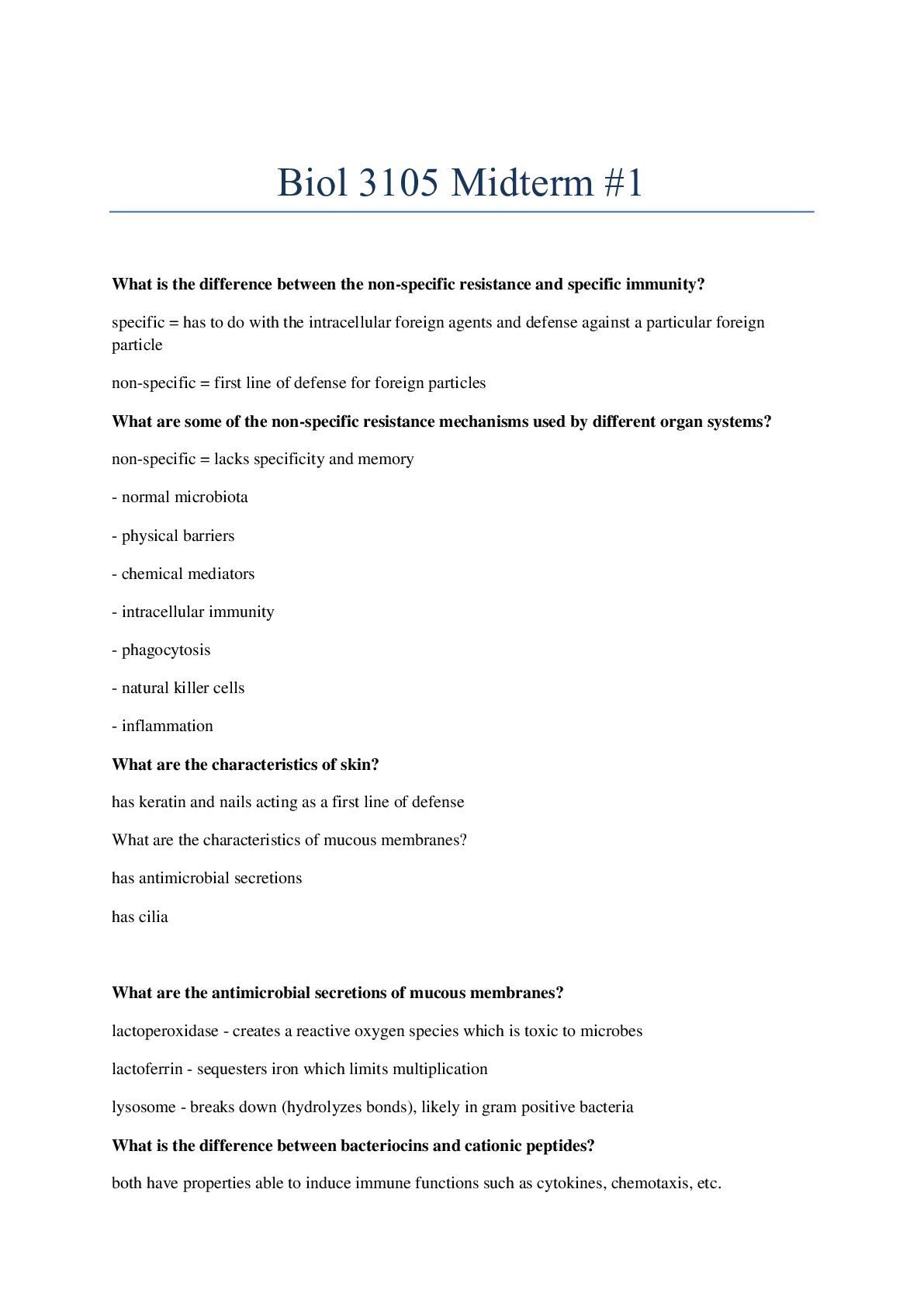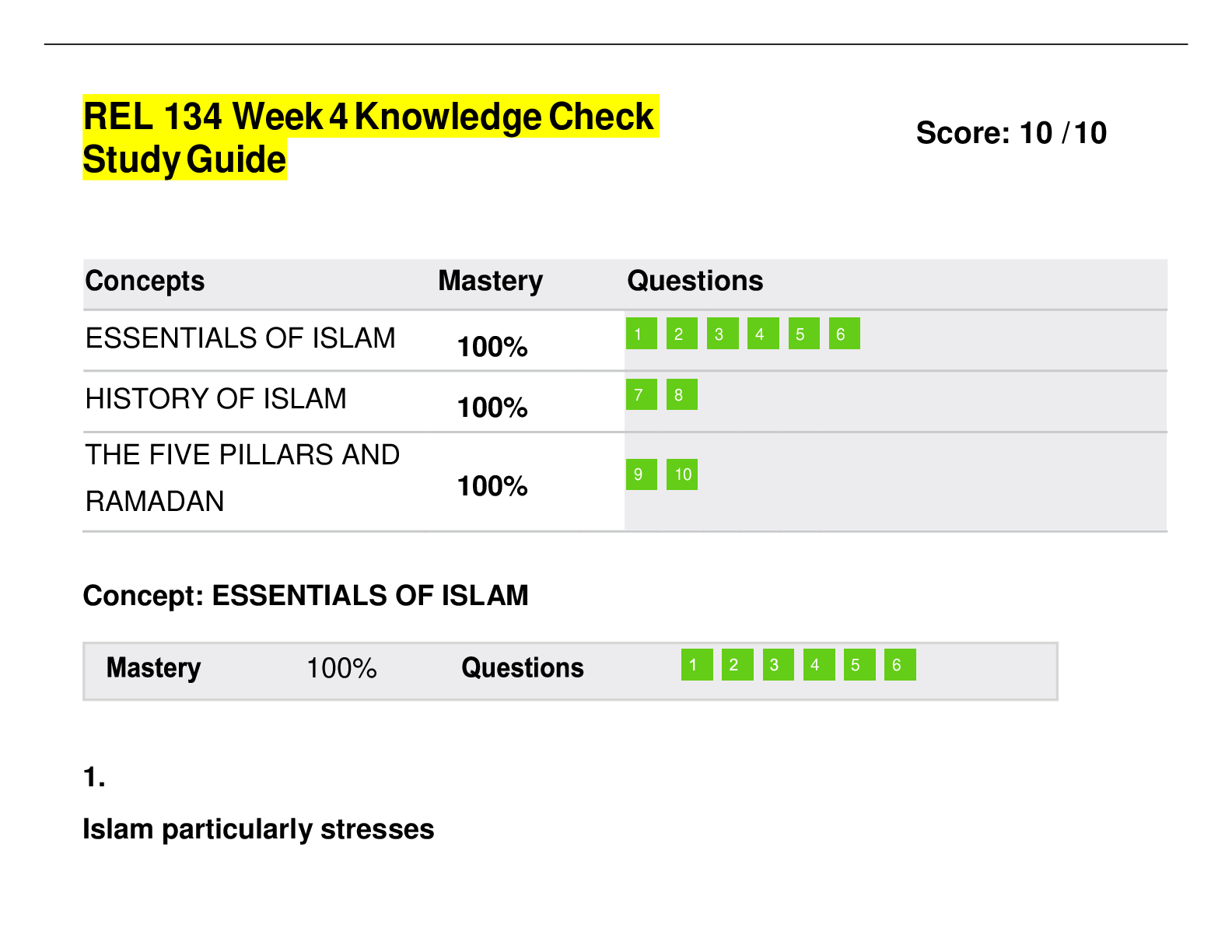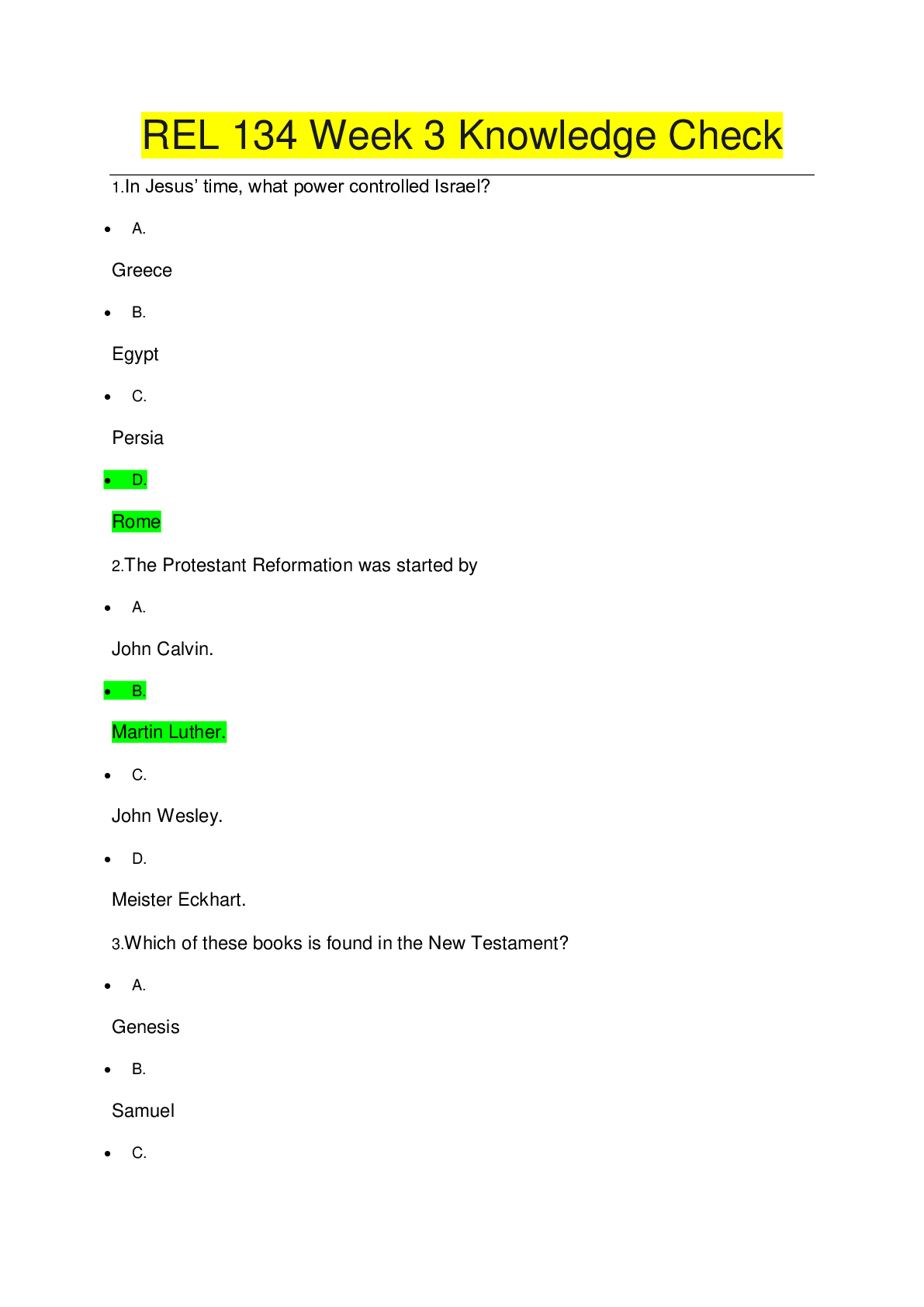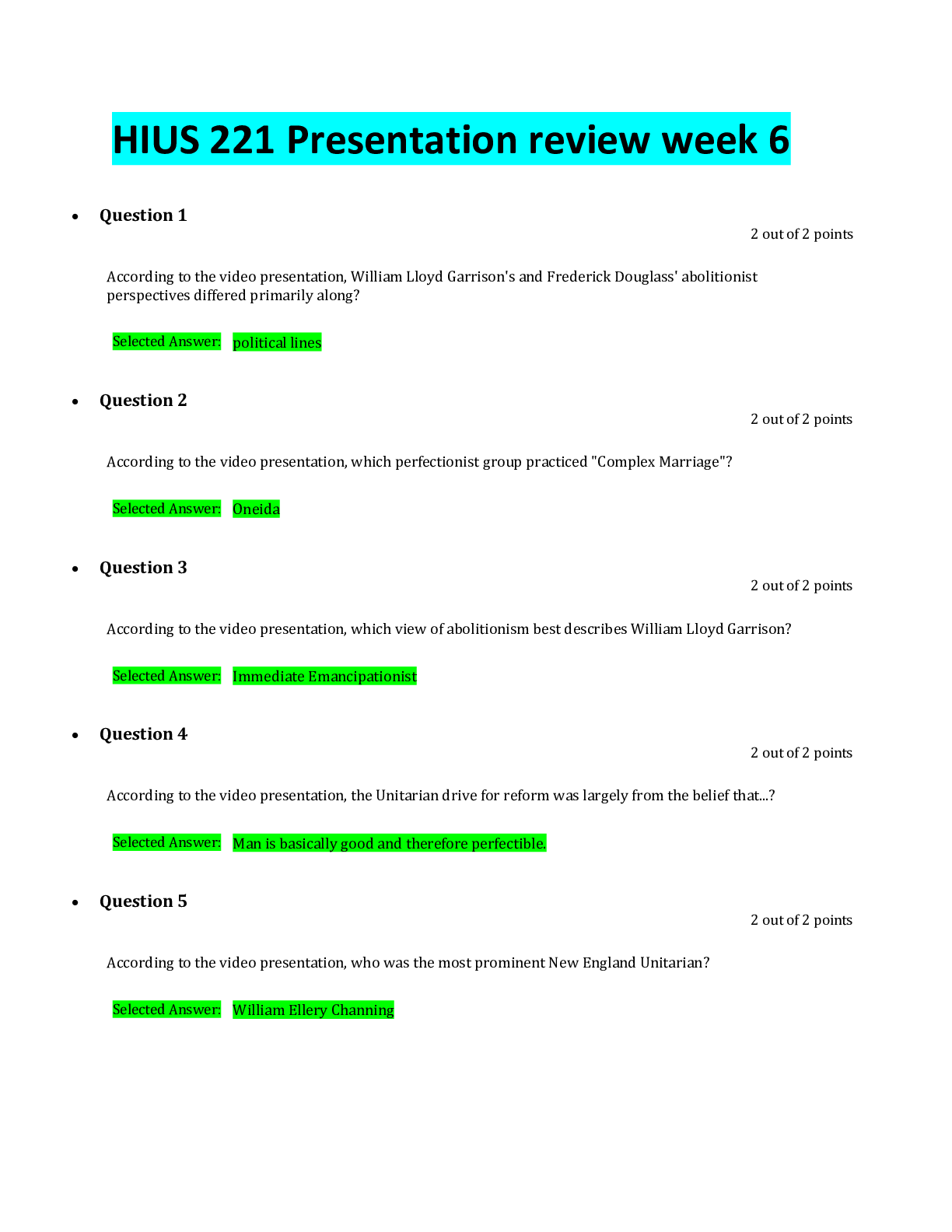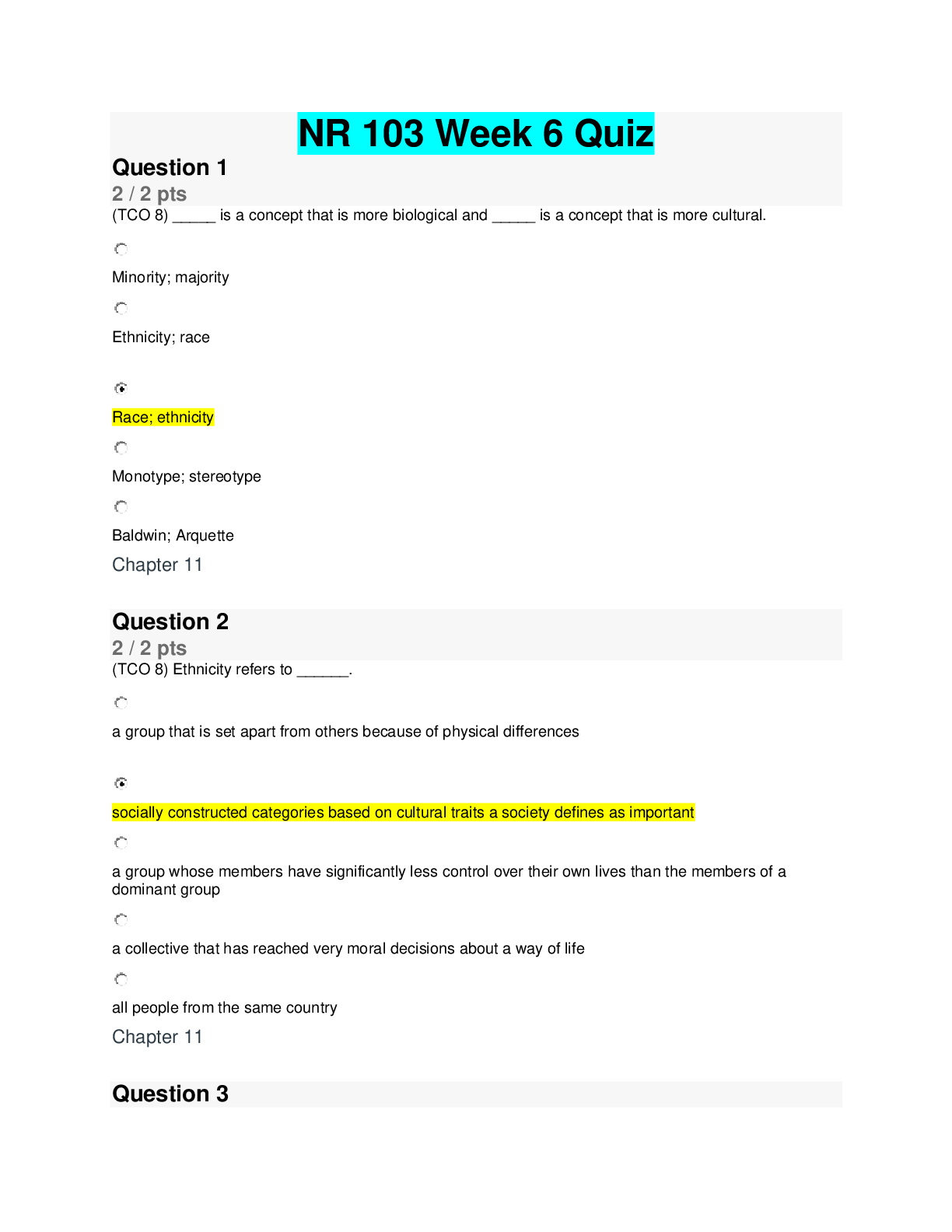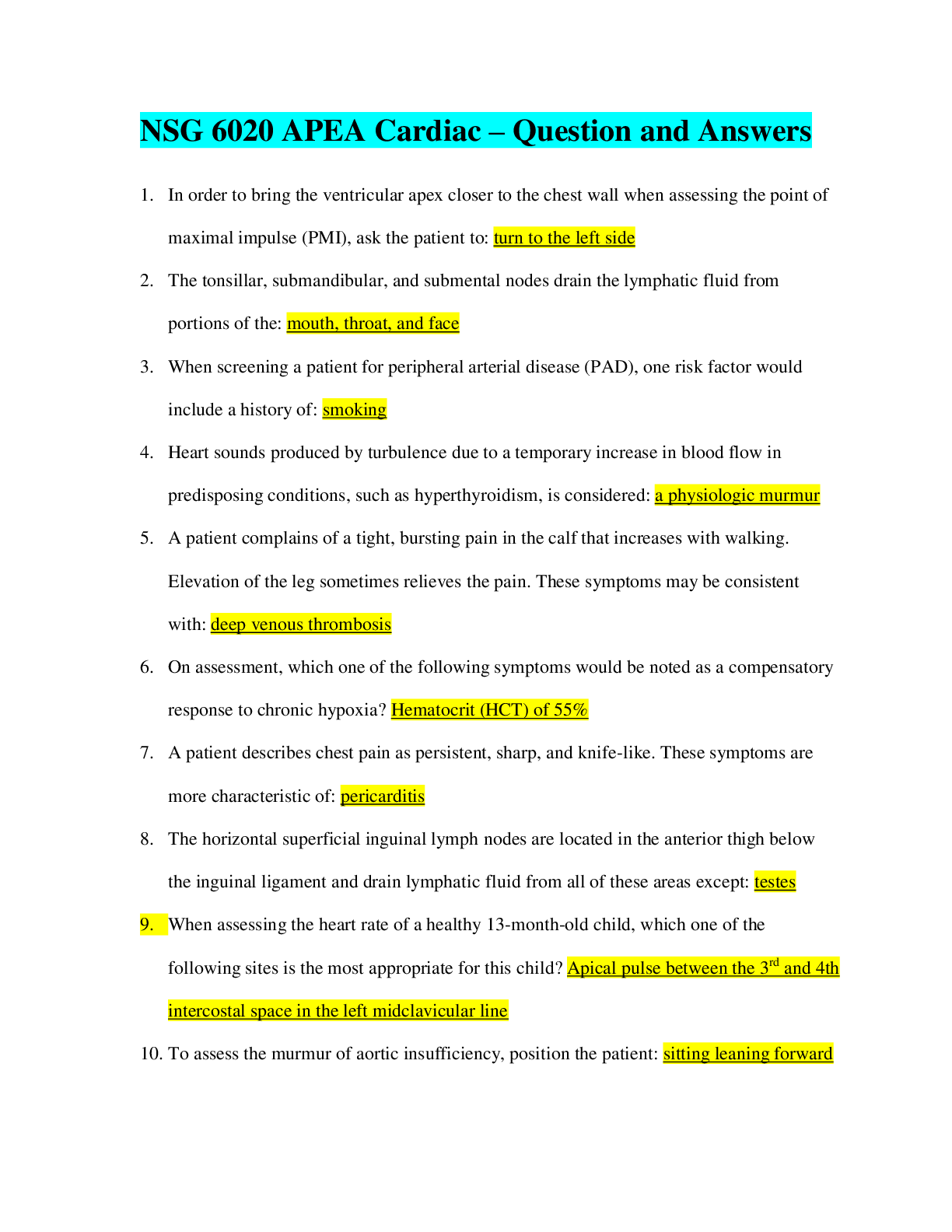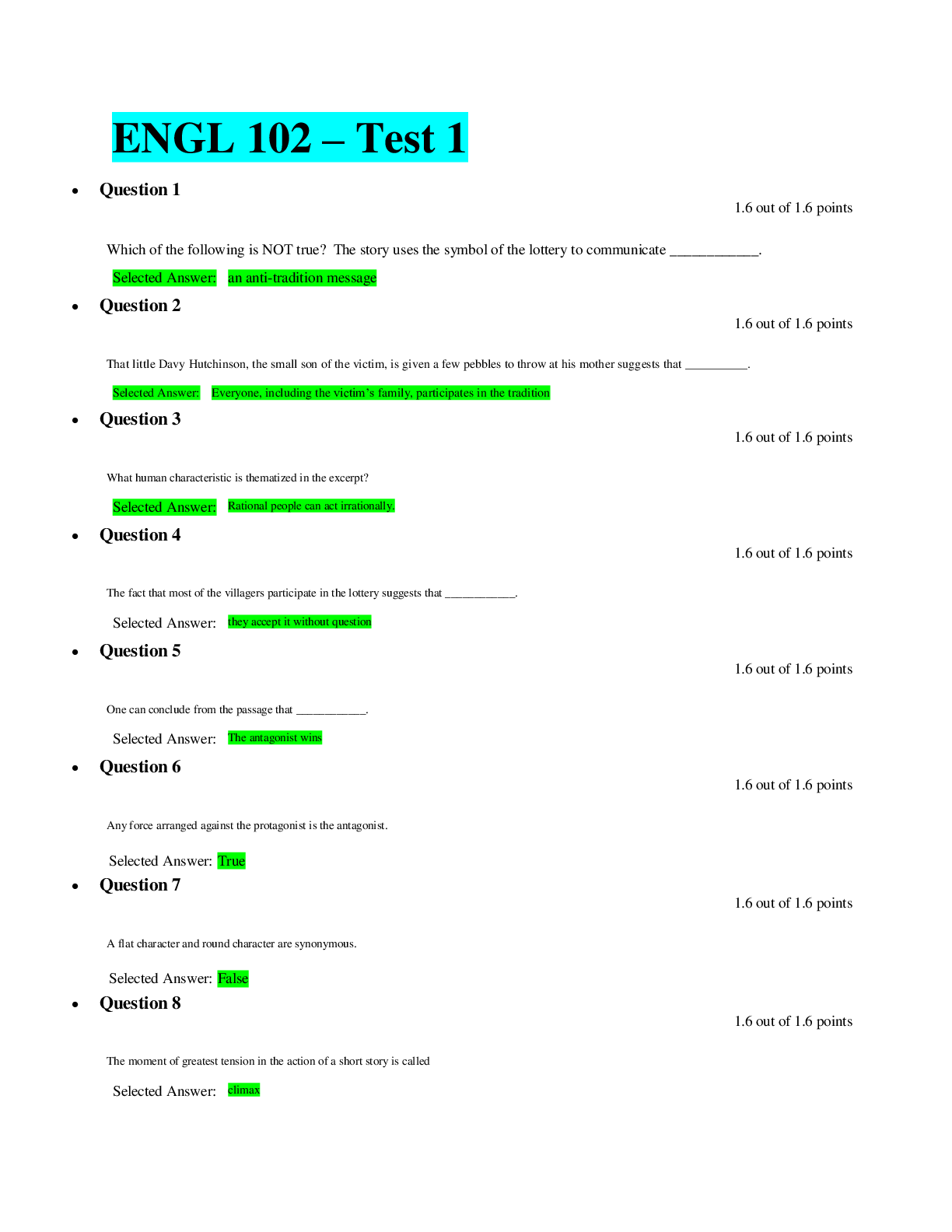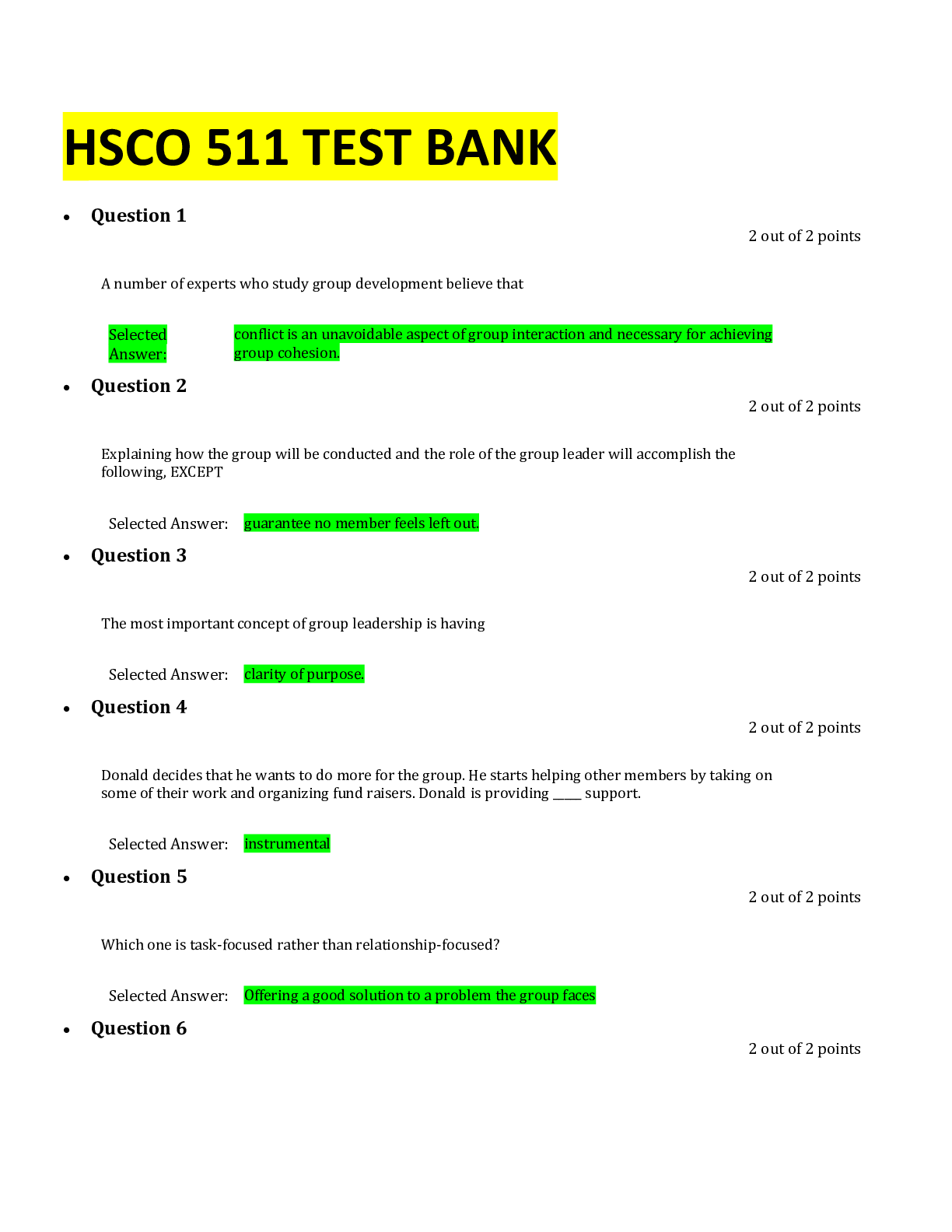*NURSING > QUESTIONS & ANSWERS > South University, Savannah NSG 6420 W4 Mid Term Exam Questions and Answers 2021 | All Answers Correc (All)
South University, Savannah NSG 6420 W4 Mid Term Exam Questions and Answers 2021 | All Answers Correct
Document Content and Description Below
1. Which of the following is the most important question to ask during cardiovascular health history? Student Answer: Number of offspring Last physical exam Sudden death of a family member Use... of caffeine Instructor Explanation: The sudden death of a family member is an important question to ask in the health history because it reveals the cardiovascular disease risk of the patient. Sudden death is usually due to an acute cardiovascular event, such as myocardial infarction, cardiac dysrhythmia, or stroke. Family history is particularly important for cardiac assessment because CVD, HTN, hyperlipidemia, & other vascular diseases often have a familial association that is not easily ameliorated by lifestyle changes. If there are deaths in the family related to CVD, determine the age & exact cause of death, because CVD at a young age in the immediate family carries an increased risk compared with CVD in an elderly family member. Ask about sudden death, which might indicate a congenital disease such as Marfan's syndrome. This is especially important to ask during pre-sports physicals because sudden death in athletes is often related to congenital or familial heart disease. Familial hyperlipidemia is autosomal dominant & often leads to CAD & MI at a young age. Family history of obesity & type 2 diabetes are also secondary risk factors for heart disease because the familial tendency for these is strong. Ask about smoking in the house, as secondhand smoke is a risk factor for respiratory & cardiac disease. (Goolsby 167-168) Question 2. A key symptom of ischemic heart disease is chest pain. However, angina equivalents may include exertional dyspnea. Angina equivalents are important because: Student Answer: Women with ischemic heart disease many times do not present with chest pain -708354236 MultipleChoice 1 False Some patients may have no symptoms or atypical symptoms; diagnosis may only be made at the time of an actual myocardial infarction Elderly patients have the most severe symptoms A & B only Instructor Explanation: The key symptom of IHD is chest pain, but other common symptoms include arm pain, lower jaw pain, shortness of breath, & diaphoresis. These symptoms are referred to as angina equivalents & can also include fatigue or breathlessness. Some patients may have no symptoms or atypical ones so that CAD may not be diagnosed until they experience a myocardial infarction. (Kennedy-Malone 227) Question 3. : A 55-year-old post-menopausal woman with a history of hypertension complains of jaw pain on heavy exertion. There were no complaints of chest pain. Her ECG indicates normal sinus rhythm without ST segment abnormalities. Your plan may include: Student Answer: Echocardiogram Exercise stress test Cardiac catheterization Myocardial perfusion imaging Instructor Explanation: Once all the results of the initial laboratory & ECG testing are reviewed, a pretest probability of disease can be generated & additional tests can be ordered.2 The probability of CAD can be calculated by considering the chosen noninvasive test's sensitivity & specificity.2 Selection of the proper cardiac test (see Table 115-1) for an individual depends on the person's risk stratification, age, & tolerable level of activity. The most common & least invasive test for diagnosis of CAD is the stress test, also called the exercise tolerance test (ETT) or treadmill exercise. (Buttaro 488) Question 4. Jenny is a 24 year old graduate student that presents to the clinic today with -708354235 MultipleChoice 2 True -708354234 MultipleChoice 3 True Student Answer: Mitral Valve Prolapse Referred Pain from Cholecystitis Pericarditis Pulmonary Embolus Instructor Explanation: Pericarditis, inflammation of the pericardium, is usually not a solo disease process but is seen in conjunction with other diseases or conditions. Pericarditis may occur as a complication of MI (Dressler's syndrome) or coronary artery bypass surgery. It is also more commonly seen in patients with connective tissue disorders such as rheumatoid arthritis, systemic lupus erythematosus (SLE), scleroderma, & sarcoidosis. Bacterial, viral, or fungal infections, including HIV, are risk factors for pericarditis. Pericarditis can occur with kidney failure or metastatic neoplasias or as a reaction to medication, particularly phenytoin, hydralazine, & procainamide. Rarely, it is idiopathic & the cause unknown, although a common viral infection is suspected. Cardiac tamponade can occur as a serious complication, & it is an emergency requiring immediate pericardiocentesis. Constrictive pericarditis can occur over time due to scarring of the pericardial sac. Signs & Symptoms: Unlike the symptoms associated with ACS, the pain accompanying pericarditis is sharp & stabbing; it may worsen with inspiration or when lying flat or leaning forward. Associated symptoms may include shortness of breath, fever, chills, & malaise. (Goolsby 179) Question 5. Which symptom is more characteristic of Non-Cardiac chest pain? Student Answer: Pain often radiates to the neck, jaw, epigastrium, shoulder, or arm Pain tends to occur with movement, stretching or palpation Pain usually lasts less than 10 minutes & is relieved by nitroglycerine -708354233 MultipleChoice 4 True Pain is aggravated by exertion or stress Instructor Explanation: Palpate chest wall for tenderness & swelling. Chest pain present in only one body position is usually not cardiac in origin.(MSN 194) Question 6. What is the most common valvular heart disease in the older adult? Student Answer: Aortic regurgitation Aortic stenosis Mitral regurgitation Mitral stenosis Instructor Explanation: Age: Present in 2% to 9% of persons over age 65, aortic stenosis is the most clinically significant cardiac valve lesion (Faggiano, 2006). Isolated aortic regurgitation is rarely seen & is usually accompanied by some degree of mitral valve involvement. Mitral regurgitation is more common than mitral stenosis in elderly individuals. Mitral valve disease, commonly caused by rheumatic heart disease, is usually acquired by younger patients; however, the effects may not be seen until they are in their forties or fifties. Mitral valve stenosis has a progressively slow course with latent symptoms over 20 to 40 years followed by rapid acceleration in later life. (Kennedy-Malone 259) Question 7. Jeff, 48 years old, presents to the clinic complaining of fleeting chest pain, fatigue, palpitations, lightheadedness, & shortness of breath. The pain comes & goes & is not associated with activity or exertion. Food does not exacerbate or relieve the pain. The pain is usually located under the left nipple. Jeff is concerned because his father has cardiac disease & underwent a CABG at age 65. The ANP examines Jeff & hears a mid-systolic click at the 4th ICS mid-clavicular area. The ANP knows that this is a hallmark sign of: Student Answer: Angi [Show More]
Last updated: 1 year ago
Preview 1 out of 15 pages
Instant download
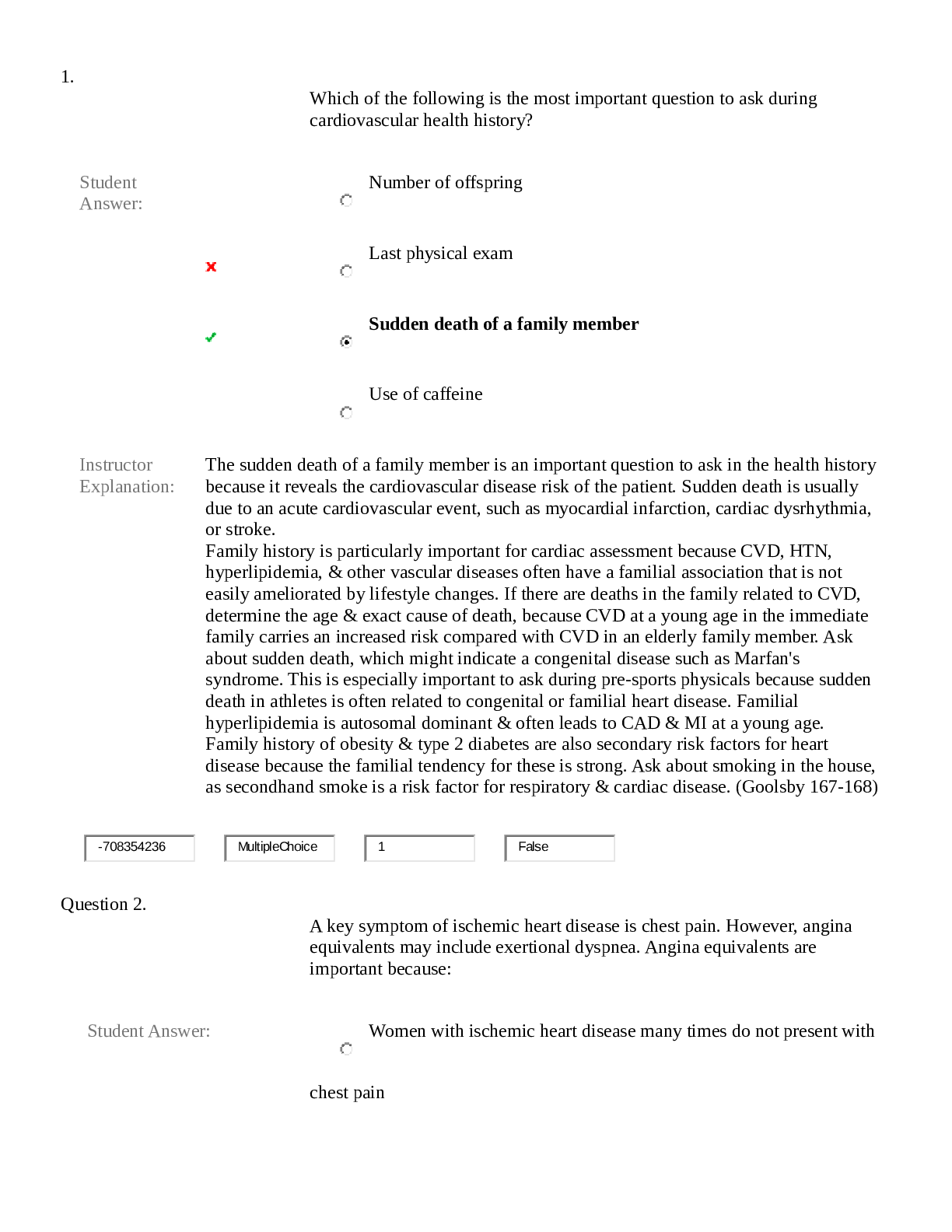
Buy this document to get the full access instantly
Instant Download Access after purchase
Add to cartInstant download
Reviews( 0 )
Document information
Connected school, study & course
About the document
Uploaded On
Sep 06, 2021
Number of pages
15
Written in
Additional information
This document has been written for:
Uploaded
Sep 06, 2021
Downloads
0
Views
35

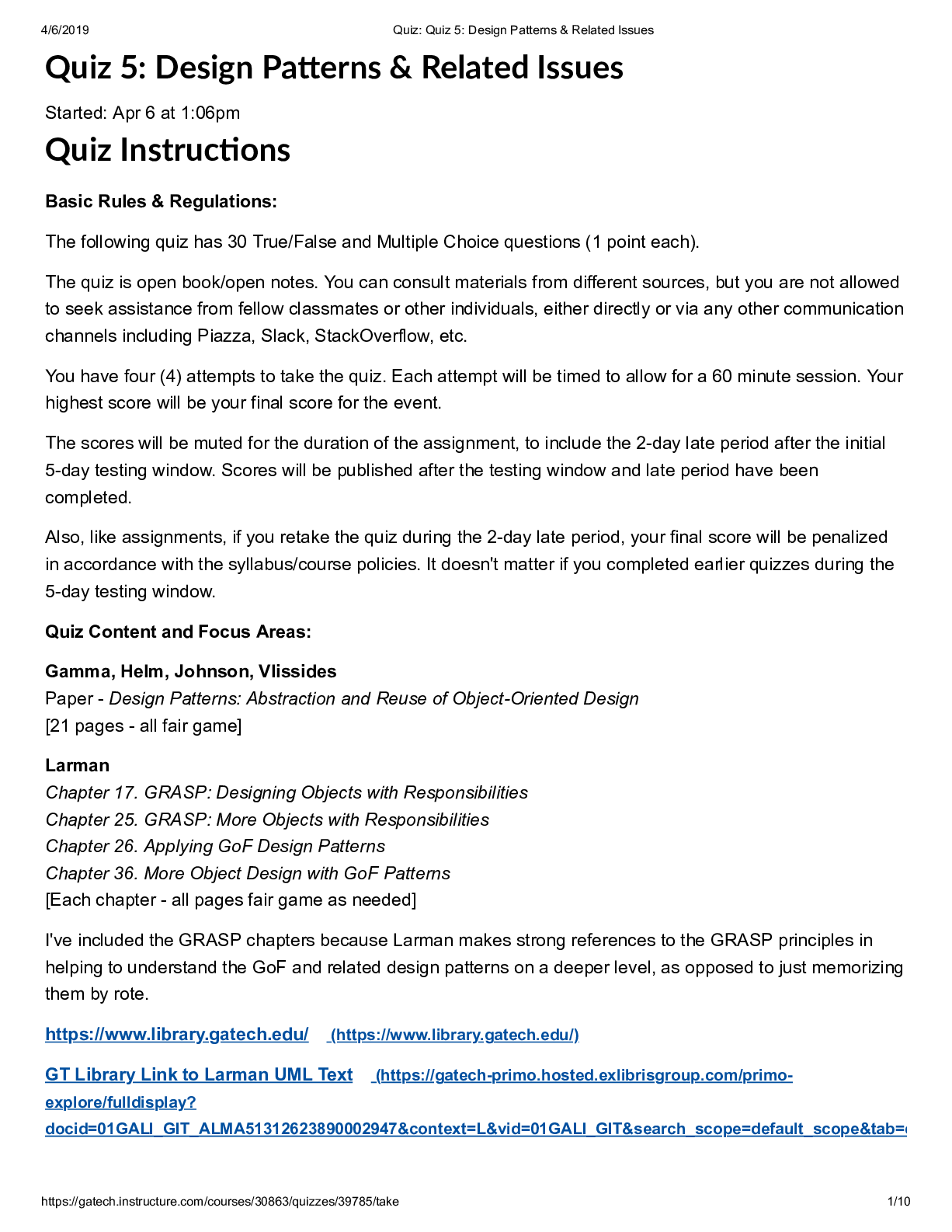

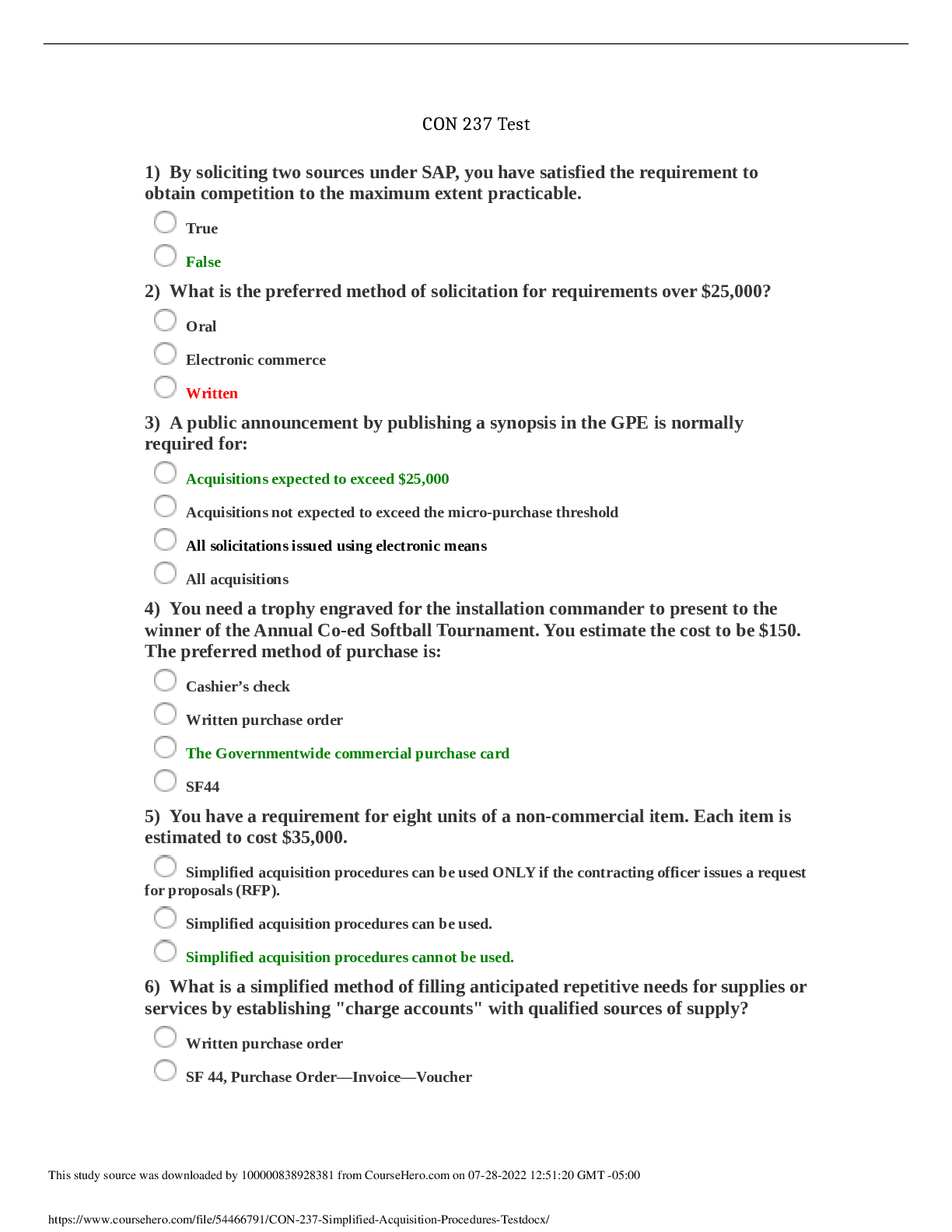
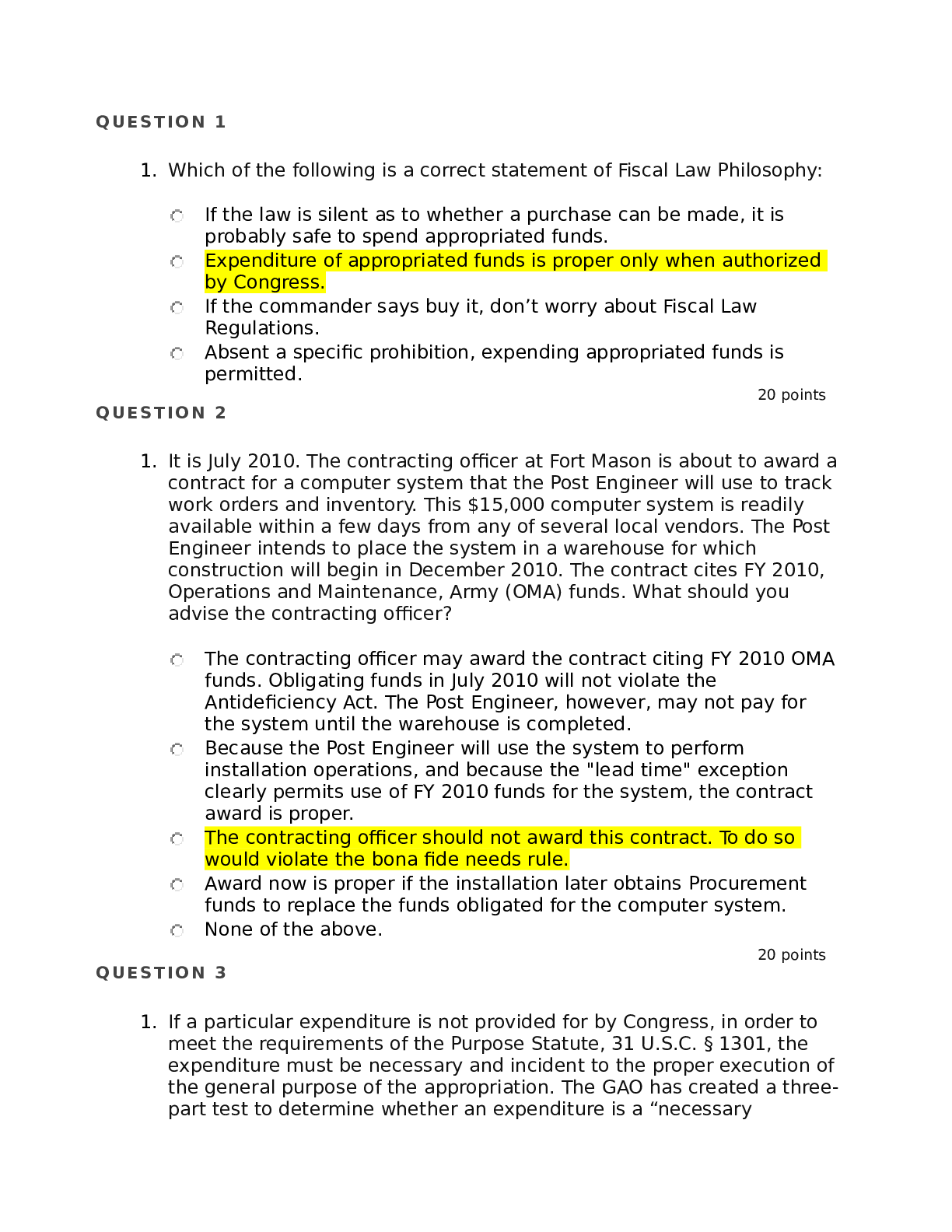
.png)

.png)
